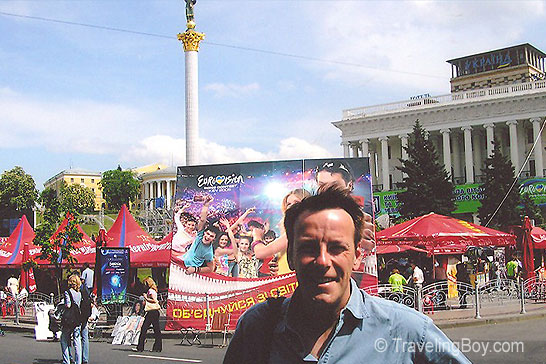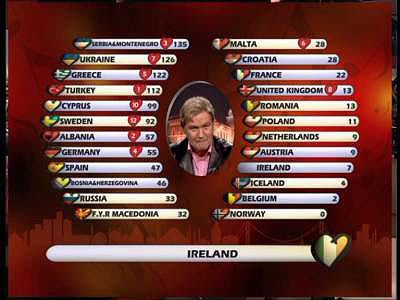 |
 |
|
 |

|
An American at Eurovision
|
|
As I sit there through this whole pageant, I wonder sometimes what I, an American, am doing here in the midst of this bizarre but quintessentially European cultural event. Yet every May I find myself on a flight to somewhere in Europe to attend this very peculiar European institution. So what in the world is this whole thing? Well, if you combine the musical competition of American Idol with the international pageantry of the Miss Universe contest, and a little of the intrigue of the United Nations, you can have an idea of what the Eurovision Song Contest is all about. The Eurovision Song Contest goes back to over 50 years ago when Europe was still licking its wounds from the last war. Looking for a little cross-border harmony, the European Broadcasting Union came up with the idea of an annual song contest where each country would select a song to represent them and promote their national culture. It would be broadcast on a live television program seen simultaneously in all the participating countries who would then each individually rank the other countries' songs at the end of the competition. The song who received the highest number of points would be declared the winner and that country would get the right to host the contest the following year. Back at its modest debut in 1956 only 7 countries took part, but as its popularity grew and the Iron Curtain fell, the ranks grew and grew. Now in 2008 there are 43 countries taking part: instead of one night of competition there are now two nights of semi-finals leading up to the Saturday night grand finale.
Back in the days when most countries had only one or two national broadcasters, the event was guaranteed a high viewership for its prime-time Saturday night spot. Ask any European about it and they are sure to tell you how they used to sit around with their families once a year to cheer for their entries. In contrast to this nostalgia however, the most likely response from a European will probably be a loud groan. For, despite the auspicious goal of promoting national cultures, the quality of the songs has often been hilariously lacking (often much like American Idol) and has given the reputation of being more of a kitsch-fest than a song contest. Through the years we have seen some of the worst excesses of 70's fashions, out of tune singers, cheesy Vegas-like choreography, bad taste gimmicks and painful crooning than you can shake a baton at. There have been hundreds of great entries, but Europeans are most likely to remember and associate the contest with the worst ones. Despite the contest's sometimes less than vaulted reputation, an audience of 300 million television viewers was a pretty tempting opportunity for any up and coming singer in which to partake. A win was a very good shot at launching an international career. Back in 1974 Sweden sent an unknown pop quartet to the contest while in 1988 Switzerland hired a young untried chanteuse from Quebec to sing their song. Both won, and a few years after that you would be pressed to find anyone who hadn't heard of either of them: Abba and Celine Dion. Beyond them, Katrina and the Waves, Nana Mouskouri, Julio Iglesias, Tatu and France Gall all had their hand at the contest (and despite wining it didn't hurt their careers any).
This was all such great fun, and year after year I began to get worrisomely hooked. Each May I began to look forward to the cassette tapes mailed by my dutiful friend. This was always a couple weeks after the contest, but as we Americans were clueless about the whole thing I never found out the winner till I'd heard all the songs and excitedly followed the voting. By 1995 the illness was growing in me and I spent $600 I didn't really have to buy a European-format VCR just so I could start watching it actual videos of it. I joined a few fan clubs, made contacts around Europe and in 2002 I was invited by some Finnish friends to actually attend the contest held that year just next door in Estonia. The excitement of being there live (and being caught on live TV in one of the audience shots) was so beyond my wildest expectations, as was meeting a number of the actual competitors. I've gone back every year since. A new country has by chance won the contest each year since then and all of them are worthy destinations in their own rights. So far this strange little hobby of mine has taken me to the likes of Estonia, Latvia, Turkey, Ukraine, Greece and last year, to Finland.
As an American I'm a bit of a curiosity showing up at the contest. I have rehearsed my standard responses to 'what are you doing here' and 'how did you find out about he contest' to a fine art. As much as we get maligned around the world for our policies, America still evokes bright lights and international success for any up and coming artist from Portugal to Poland, so I sometimes get a little more attention than I deserve. 'Sorry: I know you might be a big star in Romania, but I don't have any record contracts or exciting gigs in New York to offer you.' But Europeans are great though and I'm always made to feel part of the crowd in the sea of fans, journalists, photographers and performers. It's this spirit of international cooperation which is the most fun of going: hanging out with Turks and Greeks, Irish and Brits, Bosnians and Serbs: supporting each other's songs, discussing politics and history and amazingly all getting along. This is the good side of the politics of the contest. That is the smiling side of the contest, for the actual voting is neither so amicable nor fair. And this has become the big controversy of the contest. As previously mentioned, each country gives points to their top 10 songs of the night. In an ideal world, the best songs would get the most points, but it so often doesn't work out that way. Groups of countries tend to automatically vote for each other: no matter how tragically pathetic the Greek entry may be they can always be sure of maximum votes from Cyprus (and vice versa). Then there are long love affairs inside the respective groups of ex-Yugoslav, ex-Soviet and Nordic countries: they always exchange points too based more on geography than merit. They say it's because they share a same taste in music but I'm not so sure: Turkey and Cyprus have rather the same taste in music but, as historic enemies, I sure don't remember then exchanging many points with each other. Then there is the controversy of the 'diaspora
vote'. Turkey can't give itself any points, but it always seems
to receive top marks from Germany. Not that the average German
loves Turkish music, but the millions of Turks residing in Germany
vote in large numbers for their homeland. With Turks living all
over Western Europe, Turkey is one of the biggest beneficiaries
of the diaspora vote, as it Russia with large minorities living
all the ex-Soviet republics. You can learn a lot about European
demographic patterns from this voting phenomenon: there must be
a lot of Lithuanians in Ireland and a lot of Romanians in Spain
given the number of points going their way (and guess what? there
are!). This all leads to a lot of grumbling. Some countries like Iceland, Portugal and Switzerland don't have any voting blocks or diaspora to give them this artificial boost…and every year seem to lose out accordingly. I was sitting with the Icelandic delegation in Helsinki last year when their entry, a powerful rock ballad (and in my opinion the best entry of the night) wasn't even chosen as one of the top ten in their semi final to advance to the finale. Their place was taken by the much less worthy entries of the likes of Latvia, Moldova and Turkey. Now that was a somber evening for us. It seems a giant West-East chasm has opened up in the contest where the old western countries that have been in the contest since the start (Germany, France, UK, etc) don't stand a chance against the combined forces of the newer post-Iron Curtain countries in the East. There is a worry this could ruin the contest. The West grumbles it is an unfair playing field and they can't success. The East counters 'maybe you should send better songs'. Austria got fed up by not making it last year and has dropped out because of it. So, is there anyway to fix this? Well, they are trying, but it's pretty hard to get over several millennia of European history in just one night of music. So, where am I going this year (and thus to answer your question: 'who won last year'). If you guessed it's somewhere in the east and somewhere from the midst of a voting block then you would be correct on both accounts. Europe's own bad boy, the former Yugoslav Republic of Serbia took the top prize and will be welcoming the throngs of Europe this spring. It's not great timing for them: their historic region of Kosovo just declared independence earlier this year, leading to riots and the burning of a few embassies in Belgrade (including ours!), But I'm sure they will be gracious hosts. I'm just now sure how many countries who recognized Kosovo will be getting many points from Serbia during the voting this year. I'll tell you how it went when I get back. |
James, Barry Garcia * * * Hi Barry,
 |
This site is designed and maintained by WYNK Marketing. Send all technical issues to: support@wynkmarketing.com














